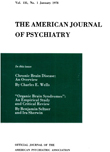Freud and Aphasia: An Historical Analysis
Abstract
Freud's monograph on aphasia has been acknowledged for its importance in the history of aphasia and its relevance for the development of psychoanalytic concepts. This author attributes to it a new significance as a final statement of late 19th-century neurology. Although Freud's own presentation on aphasia was limited by the absence of a neurophysiology upon which he could draw, he pointed out the illogicality of constructing an anatomical model on the basis of a psychological concept, thus identifying one of the major fallacies inherent in the principal psychophysical formulations of the time.
Access content
To read the fulltext, please use one of the options below to sign in or purchase access.- Personal login
- Institutional Login
- Sign in via OpenAthens
- Register for access
-
Please login/register if you wish to pair your device and check access availability.
Not a subscriber?
PsychiatryOnline subscription options offer access to the DSM-5 library, books, journals, CME, and patient resources. This all-in-one virtual library provides psychiatrists and mental health professionals with key resources for diagnosis, treatment, research, and professional development.
Need more help? PsychiatryOnline Customer Service may be reached by emailing [email protected] or by calling 800-368-5777 (in the U.S.) or 703-907-7322 (outside the U.S.).



